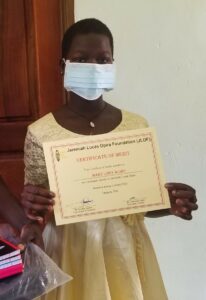Covid-19 and Children
Essay from Jeremiah Lucas Opira Memorial Contest 2020
Author: Aciro Mary Lindy, 14 years old
2020 Winner, Category 1


Introduction
Covid-19 pandemic has a number of effects on so many groups of people. Children, just like other groups of people are not the face of this pandemic. They have been change it’s biggest victims, has children’s life are nonetheless have been change in profound ways. All children of all ages, and in all regions have been affected, particularly by socio-economic impacts. This is a universal crisis and for some children the impacts will be lifelong. Moreover, the harmful effects of this pandemic has not been distributed equally. They were most damaging for children in the poorest regions and in the poorest neighbourhoods and those in already disadvantaged situations. These effects can be seen has as discussed below.
- Disrupting learning process following the outbreak of covid-19, almost all the countries imposed countrywide school closures during the pandemic, affecting a large number of children’s learning. This has hit hard on school going children who lives in poorer sides of the country, for example, here in northern Uganda where so many school children lack resources to invest in digital learning and many children from poorer households do not have access to the internet. In some places, it has been worst since the school closures have led to an increase in child marriage and child labour which often prevent children from continuing their education.
- Pushing more households into poverty. As families lose their sources of income due to covid-19, more households, particularly here in northern Uganda, are falling into monetary poverty. For the poorest families, including those who do not have access to social protection, the situations is terrible because children experience poverty differently than adults. With no access to education, healthcare, nutrition, sanitation etc. this has greatly affected the life of children in the region.
- Threat to survival and health of children. The outbreak of covid-19 pandemic has caused a serious disruptions of live saving health services for children such as immunization and anternatal care services which have resulted into devastating increase in child death. The pandemic has also reversed decades of progress made within the country toward eliminating preventable child death. And also the number of still death increased as women were not able to access anternatal health services during the lockdown period.
- More vulnerable children suffering from malnutrition. Several children have become malnourished due to the deteriorating quality of their diets and multiple shocks created by the pandemic and its containment measures – covid-19 has completely disrupted food system and thus threatening food security and these have been terrible for children in poorer households.
- Increased risk of violence, exploitation and abuse. The lockdown measures, brought about by covid-19, have exposed children to a range of risks. Several factors related to confinement measures have resulted in to increased tensions in the households. The well known risk factors at home are: economic uncertainty, job loss, disruption to livelihood and social isolation which has increased the risks of violence against children.
Action plans to manage the consequences of covid-19 on children
As parents and caregivers, we can do the following to help children cope with stress due to covid-19 pandemic.
- Responding to children’s reactions in a supportive way; since children may respond to stress in different ways such as being more clingy, anxious, withdrawing, angry and agitated.
It is therefore the responsibility of parents and caregivers to respond to children reactions in a supportive way. Listen to their (children’s) concerns and give them extra love and attention. - Parents an caregivers should try and keep their children close to them and avoid separation to the extend possible. If in case a separation occurs, for example hospitalization (sickness), ensure regular contact with your child, for instance via phone reassurance.
- Create a routine for your child. Parents should keep regular routines and schedules as much as possible. You can as well create new routines for your child in a new environment. Your child routine should include school learning as well as time for safely playing and relaxing.
- Create household rules: You can do this together with your child.
– Your rule should include time for revision, lunch and outdoor activities. You can as well use your child’s classroom rules to guide you in making a household rule.
– Help your child get started in activities.
– Allow and create as many activities as possible for your child. Allow them to do certain things on their own.
– Motivate your child: parents should praise their children for good things they have done. This will give them courage for more challenges.
– Put limit on screen time: set a specific time for which screen or television can be watched and make sure you stick to it, e.g. twice a week.

